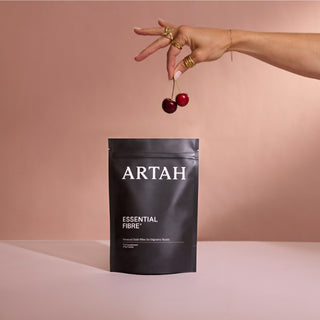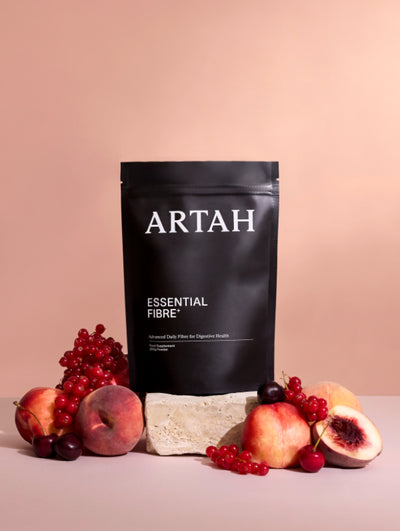Here's 6 Reasons Why.
Everything in moderation is something you’ll never hear me say. Now bear with me, because I completely understand that this may sound harsh, and contrary to what you’ve been encouraged to believe. But I’ve been in this industry for two decades, and this is probably the advice that I’ve seen cause the most confusion. Learning to nourish ourselves and navigate our current food landscape is challenging enough, and this advice just adds to the confusion. Whilst I absolutely believe it is important to cultivate balance and enjoy what we’re eating, it’s also important to understand how powerful different foods are as drivers of health or disease. It's also important to tune in to how foods make us feel when we eat them – not just in the moment, but also in the hours, days, and weeks to follow. Here’s why 'everything in moderation' can harm your health.
Some foods are designed to hijack our brain chemistry.
Food has an enormous influence on our brain chemistry. Specific combinations of salt, sugar and fat can elicit the same reward response in the brain as seen with addictive substances like alcohol, morphine, and cocaine, which is one of the reasons why applying the ‘moderation’ principle to highly palatable ultra processed food (UPF) is an uphill battle. These are not foods we can easily moderate because they are engineered to make us eat more volume, more quickly. Because of their composition, they can also be highly inflammatory, which has a knock-on effect on our mental health; it makes us more agitated, more anxious, hungrier, and more susceptible to anxiety and depression. If you’re interested in learning more about why food processing is harming us, I can’t recommend Chris van Tulleken’s book, Ultra-Processed People, highly enough.
Some foods are proven to cause chronic disease.
I need to spend a little more time on UPFs before I move on, because they have now been directly linked to 32 different negative health outcomes, including a higher risk of heart disease, cancers, type 2 diabetes, mental health disease and early death. (1) Even a 10% increment in the diet's proportion of UPF is associated with an increased risk of overall cancer risk (2). Why are these foods so harmful? It’s a combination of things. UPFs are usually low in fibre, high in emulsifiers and food chemicals, and have a low nutrient to energy ratio – in other words, are a source of empty calories. This combination is not only disruptive to the microbiome, blood sugar regulation, inflammation, and energy production, but it also means that the more UPFs we eat, the less protein, fibre, and vitamin-mineral rich whole foods we’re eating.
It disregards how we feel.
This is a big one. For me, working out what is moderate for someone is hugely dependent on how they feel, and how they feel is influenced by many different factors. The state of their gut health, their energy, how much they exercise, how much fibre, plants and protein they get in their diet, their sleep quality and levels of stress are just some of the dynamic factors that dictate how we feel, so need to be taken into account when assessing what to eat. Because of this, it’s important to spend time connecting what we eat to how we feel, which takes time. It’s easy to justify feeling overwhelmed and anxious from workload alone, but what we’re eating will have a massive impact on this. I’ll give you an example. Erratic blood sugar can cause anxiety. When our blood sugar falls, we pump out adrenaline to signal the liver to release more glucose to get our levels up. This can make our heart race, our palms sweat, our mood irritable, and make us feel anxious. It also causes an increase in our stress hormone, cortisol, which over time, perpetuates feelings of stress and anxiety. So whilst we may think we’re eating everything in moderation, our blood sugar – and other symptoms like gut symptoms, headaches, mood and focus - may be telling us otherwise. My starting point? Let’s get you feeling and functioning well – which usually means cutting back on alcohol, added sugar, and UPF – before we try to work out what moderate means for you.
It ignores the cumulative effects of harmful foods.
The best example of this is alcohol, which is one of life’s pleasures – but also a known neurotoxin, carcinogen, and microbiome disruptor. To say the guidelines around alcohol are misleading is an understatement. Whilst the NHS suggests that 14 units per week is the status quo, Breast Cancer UK states ‘even very light drinking (1 drink/week) increases {breast cancer} risk.’ With breast cancer the most diagnosed cancer globally, this is a concerning contradiction. Fertility is another example of muddied guidelines; Drinkaware UK sates ‘fact: alcohol can decrease female fertility. Light drinking reduces fertility in women, and fertility is reduced even further in women drinking moderately or heavily.’ Finally, the Centre for Disease Control and Prevention (CDC) alongside the National Institute on Alcohol Abuse and Alcoholism (NIAAA) states that women should limit themselves to one drink per day/7 drinks per week or less to avoid alcohol related disease.’ Put into context, that’s about 10.5 units weekly as the upper limit vs 14 units from the NHS, which by NIAAA guidelines, is classified as heavy drinking. This is just one risk factor; when we layer in other foods, these risks are compounded. Confused? I hear you.
It’s 100% subjective.
There is no nutrition education in school, so most of our nutritional beliefs are informed by our upbringing, our emotional experiences with food, and by food marketing/the media. We all have different engrained beliefs around what is good or bad, and even different relationships to the words good and bad, which makes moderation a difficult principle to navigate. The bottom line is what feels moderate to some may feel unachievable or overindulgent to others.
It doesn’t help us understand what to eat.
Defaulting to the principle of moderation is understandable; we’ve already touched upon how confusing various guidelines are, so moderation feels like a rational rule to follow. But, before you try to work out what’s moderate, let’s go over some of the goals to strive towards.
- 30g of fibre per day; most adults in the UK get 16g.
- An absolute minimum of 0.8g, but more optimally, 1.2g of protein/kg of body weight per day.
- 30 different varieties of plant foods per week in their natural form; this can include nuts, seeds, herbs, vegetables, fruit, whole grains, beans and lentils.
- A reduction in the consumption of added sugar as much as possible, if not entirely, from your daily routine.
If you're focusing on what to include, you’ll automatically reduce your consumption of health-harming foods. Next, if you are struggling with an imbalance or health issue, like IBS, erratic blood sugar, or low mood, consider doing a reset to eliminate pro-inflammatory foods, nourish the microbiome and get blood sugar under control. By doing this for a short time, you can experience how your body can feel and how much of an impact food and alcohol have on your health.
If you’re interested in following a targeted nutrition plan to help you reset your baseline, try:
- The 28 Day Reset , for overall energy and wellbeing
- The Microbiome Cleanse, for IBS and gut issues
- The Metabolic Reset, for metabolism and body composition
If you’re interested in using targeted supplements to help you reset some of your symptoms, try:
- The Gut Recovery Set, for chronic gut issues and discomfort
- Metabolic Fix, for cravings and energy
- Enhanced Nootropics and Biome Restore, to help combat the negative effects of stress
Disclaimer: This article is for educational purposes only and is not meant to treat, diagnose, or prevent disease. The information in this article is not intended to replace the advice or care of your medical doctor.
References:
-
BMJ 2024;384:e077310
-
Isaksen IM, Dankel SN. Ultra-processed food consumption and cancer risk: A systematic review and meta-analysis. Clin Nutr. 2023 Jun;42(6):919-928. doi: 10.1016/j.clnu.2023.03.018. Epub 2023 Mar 30. PMID: 37087831.
Other resources:
-
https://www.drinkaware.co.uk/facts/health-effects-of-alcohol/pregnancy-and-fertility/is-alcohol-harming-your-fertility#femalefertilityandalcohol
-
https://www.nhs.uk/live-well/alcohol-advice/calculating-alcohol-units/#:~:text=men%20and%20women%20are%20advised,drink%2Dfree%20days%20each%20week
-
https://www.cdc.gov/alcohol/fact-sheets/alcohol-use.htm



















































